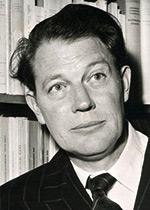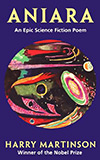Harry Martinson
| Full Name: | Harry Edmund Martinson |
| Born: | June 5, 1904 Nyteboda, Jämshög, Blekinge, Sweden |
| Died: | November 2, 1978 Stockholm, Sweden |
| Occupation: | Writer |
| Nationality: | Swedish |
| Links: |
|
Biography
Harry Martinson was a Swedish author, poet and former sailor. In 1949 he was elected into the Swedish Academy. He was awarded a joint Nobel Prize in Literature in 1974 together with fellow Swede Eyvind Johnson "for writings that catch the dewdrop and reflect the cosmos". The choice was controversial, as both Martinson and Johnson were members of the academy.
He has been called "the great reformer of 20th-century Swedish poetry, the most original of the writers called 'proletarian'."
Martinson was born in Jämshög, Blekinge County in south-eastern Sweden. At a young age he lost both his parents whereafter he was placed as a foster child (Kommunalbarn) in the Swedish countryside. At the age of sixteen Martinson ran away and signed onto a ship to spend the next years sailing around the world visiting countries including Brazil and India.
A few years later lung problems forced him to set ashore in Sweden where he travelled around without a steady employment, at times living as a vagabond on country roads. At the age of 21, he was arrested for vagrancy in Lundagård park, Lund.
In 1929, he debuted as a poet. Together with Artur Lundkvist, Gustav Sandgren, Erik Asklund and Josef Kjellgren he authored the anthology Fem unga (Five Youths), which introduced Swedish modernism. His poetry, characterized by linguistic innovation and a frequent use of metaphors, combined an acute eye for, and love of nature, with a deeply felt humanism. His popular success as a novelist came with the semi-autobiographical Nässlorna blomma (Flowering Nettles) in 1935, about hardships encountered by a young boy in the countryside. It has since been translated into more than thirty languages. The novel Vägen till Klockrike (The Road to Klockrike, 1948) was another huge success, and in 1949 Martinson became the first proletarian writer to be elected a member of the Swedish Academy.
One of his most noted works is the poetic cycle Aniara, which is a story of the spacecraft Aniara that during a journey through space loses its course and subsequently floats on without destination. The book was published in 1956 and became an opera in 1959 composed by Karl-Birger Blomdahl. The cycle has been described as "an epic story of man's fragility and folly".
Works in the WWEnd Database
|
|
|
|
|
|||||||||||||||



















 Full Details
Full Details








